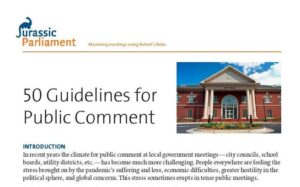50 Guidelines for Public Comment in Local Government

The public comment period is an essential part of local government meetings. This new publication offers 50 guidelines for public comment, and includes a sample public comment announcement. It is an update from our 2018 guidelines.
These guidelines refer to ordinary business and work or study meetings of councils, boards and committees. Public hearings and quasi-judicial hearings are governed by different rules.
It is important for elected officials and for the public to be very clear about the purpose of the public comment period. This is an opportunity for members of the public to inform the governing body about their views. The meeting itself belongs to the governing body. The public does not PARTICIPATE in the decision-making. Instead, it PROVIDES INPUT to the governing body, which takes the input into consideration in making its decisions.
A governmental body must craft its requirements with care in order to to preserve the free speech rights of its citizens. If questions arise about the public comment period, consult your attorney. State law and regulations and your specific bylaws or rules of procedure have higher standing than Robert’s Rules of Order, other parliamentary authorities, or these guidelines.


Ann;
Thanks for these guidelines. They’re equally helpful on both sides of the dais. I’m certainly going to start calling out boardmembers who are, “Demonstrating lack of interest in what the public is saying.”
We already talked about minutes. So moving upward and onward, as to, “The council has the right to set limits on what subjects may be addressed, how long public comment will be, and how many times people may speak. All such limits must be viewpoint neutral: they must not favor one point of view over another.”
I wish you said something more specific like what some are doing about restricting to agenda topics. That’s something I support – restricting public comment to what’s on the agenda saves time & money – and shows respect to the taxpaying citizens who made a sacrifice in time and money to attend to give quality public input.
I’d also love to see transit boardmembers have some, “other channels to connect with your public” that are truly meaningful like a coffee or a Town Hall. A webform or “e-mail the Board” isn’t sufficient methinks.
But otherwise, thank you again. Clearly you put a lot of time and effort into this. You’re a timeless resource.
Joe
Joe, I’m happy to know that you find these guidelines helpful. Yes, we’ve invested quite a bit of time and thought in this project, as there isn’t anything else out there on this topic, as far as I can see.
I agree completely about limiting comment to agenda topics! We’ll keep that in mind for the second edition!
With gratitude for your passion and thoughtful response – Ann